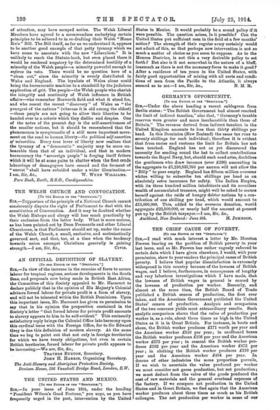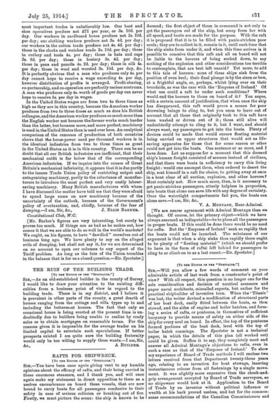THE CHIEF CAUSE OF POVERTY.
[To TER EDITOR OF THE "5PECTATOR...1 SIR,—I read with much interest a letter by Mr. Moreton Frewen bearing on the problem of British poverty in your last issue, and as Mr. Frewen has rather vaguely referred to certain data which I have given elsewhere, I would, with your permission, show to your readers the principal cause of British poverty. I believe that popular dissatisfaction is extremely widespread in this country because of the lowness of British wages, and I believe, furthermore, in consequence of lengthy and very laborious investigations which I have made, that the lowness of British wages in general is caused by the lowness of production per worker. Recently, and almost at the same time, the British Board of Trade published a British census of production, the first ever taken, and the American Government published the United States' census of production. Analysis and comparison of the two censuses yields most extraordinary results. Such analytic comparison shows that the value of production per worker is, as a rule, about three times as high in the United States as it is in Great Britain. For instance, in boots and shoes, the British worker produces 2171 worth per year and the American worker 2516 per year ; in cardboard boxes the British worker produces £106 per year and the American worker 2275 per year ; in cement the British worker pro- duces 2192 per year and the American worker 2472 per year ; in clothing the British worker produces 2158 per year and the American worker 2484 per year. In dozens of other industries the same proportion prevails. If we wish to ascertain the value produced per worker we must consider not gross production, but net production ; we must deduct from the value of the goods produced the cost of raw materials and the general overhead expenses of the factory. If we compare net production in the United States and in Great Britain, we find again that the American worker produces about three times as much as his British colleague. The net production per worker in some of our
most important trades is unbelievably low. Our boot and shoe operatives produce net 01 per year, or 3s. 10d. per day. Our workers in cardboard boxes produce net 2s. 10d. per day ; our clothing workers produce net 3s. 4d. per day ; our workers in the cotton trade produce net 4s. 4d, per day; those in the clocks and watches trade 3s. 10d. per day; those in cutlery and tools 4s. per day ; those in hats and caps 3s. 8d. per day; those in hosiery 3s. 4d. per day; those in pens and pencils 4s. 2d. per day; those in silk 4s. per day; those in wool and worsted 3s. 10d. per day, &c. It is perfectly obvious that a man who produces only 4s. per day cannot hope to receive a wage exceeding 4s. per day, however distribution of profits is arranged. Profit-sharing, co-partnership, and co-operation are perfectly useless nostrums. A man who produces only 4s. worth of goods per day can never hope to receive 5s. per day in wages.
In the United States wages are from two to three times as high as they are in this country, because the American worker produces from two to three times as much as does his British colleague, and the American worker produces so much more than the English worker not because the former works much harder than the latter, but because more, and more perfect, machinery is used in the United States than is used over here. An analytical comparison of the censuses of production of both countries shows that the horse-power used per thousand workers is in the identical industries from two to three times as great in the United States as it is in this country. There can be no doubt that all our British industries are inefficient, that their mechanical outfit is far below that of the corresponding American industries. If we inquire into the causes of Great Britain's mechanical inferiority, it appears that it is due partly to the insane Trade Union policy of restricting output and antagonizing machinery, partly to the reluctance of manufac- turers to introduce the most perfect and very costly labour- saving machinery. Many British manufacturers with whom I have discussed the matter have told me that they were afraid to spend large sums on new machinery because of the uncertainty of the outlook, because of the Government's policy of overtaxation, and, chiefly, because of the fear of [Mr. Barker's figures are very interesting, but surely he proves too much. If things are as bad as he makes out, how comes it that we are able to do so well in the world's markets P We ought, on his figures, to have "dawdled" ourselves out of business long ago. We have plenty to say on the alleged evils of dumping, but shall not say it, for we are determined on no account to open our columns to any aspect of the Tariff problem. As long as the fate of the Union trembles in the balance that is for us a closed question.—En. Spectator.]







































 Previous page
Previous page